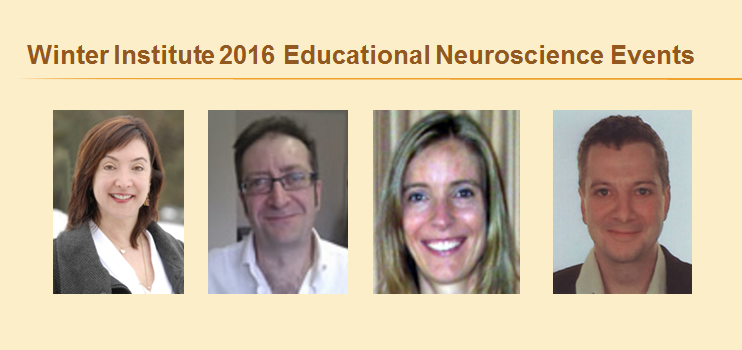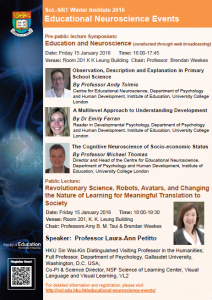Winter Institute 2016 Educational Neuroscience Events

Register
Pre-public lecture Symposium: Education and Neuroscience
(conducted through video broadcasting)
Date: Friday 15 January 2016
Time: 16:00-17:45
Venue: Room 201 K K Leung Building [Refreshments will be served]
Chair: Professor Brendan Weekes
Talk 1: Observation, Description and Explanation in Primary School Science
By Professor Andy Tolmie (Centre for Educational Neuroscience, Department of Psychology and Human Development, Institute of Education, University College London)
Research has identified the core skills that predict success during primary school in reading and arithmetic, and this knowledge increasingly informs teaching. However, there has been no comparable work which pinpoints the core skills that underlie success in science. Growing evidence suggests that early-emerging tacit awareness of causal associations is initially separated from language-based causal knowledge, which is acquired in part from everyday conversation and often shows inaccuracies not evident in tacit knowledge. Research on primary age children’s understanding of physical state change (melting, freezing, evaporation and condensation) provides initial evidence of the impact of conversation and the different routes to learning that appear when it is not available. This work suggests that mapping of descriptive and explanatory language onto each other and onto causal awareness may be a key development in science learning.
Talk 2: A Multilevel Approach to Understanding Development
By Dr. Emily Farran (Reader in Developmental Psychology, Department of Psychology and Human Development, Institute of Education, University College London)
The multilevel approach refers to understanding cognitive development by investigating the interplay across genes, brain, environment and behaviour. I will introduce the multilevel approach and use examples to answer some of the following questions. Can neural markers be employed as early predictors of later behavioural impairment? In developmental disorder research, can we use neural methods to provide a purer measure of where a deficit is? What is the role of the environment in cognitive development? Can a skill be driven via an alternative neural pathway? How can neural variability and neural changes inform intervention?
Talk 3: The Cognitive Neuroscience of Socioeconomic Status (SES)
By Professor Michael Thomas (Director and Head of the Centre for Educational Neuroscience, Department of Psychology and Human Development, Institute of Education, University College London)
In this talk, I will discuss recent cognitive neuroscience evidence on how SES influences cognitive and brain development. SES has been identified as a key environmental measure that influences health, cognition, and educational outcomes in child development. However, it is proxy measure that does not identify the actual causal processes influencing development. I will discuss how recent evidence from behavioural and brain imaging studies may help us isolate the relevant mechanistic pathways and point to interventions to alleviate the effects of deprivation on cognitive development.
Public Lecture: Revolutionary Science, Robots, Avatars, and Changing the Nature of Learning for Meaningful Translation to Society
Date: Friday 15 January 2016
Time: 18:00-19:30
Venue: Room 201, K. K. Leung Building [Sandwiches and coffee will be served]
Chair: Professors Amy B. M. Tsui & Brendan Weekes
Speaker: Professor Laura-Ann Petitto
HKU Sin Wai-Kin Distinguished Visiting Professor in the Humanities;
Full Professor, Department of Psychology, Gallaudet University, Washington, D.C. USA;
Co-PI & Science Director, NSF Science of Learning Center, Visual Language and Visual Learning, VL2
Focus: An example of the powerful integration of science technology, and the integration of interdisciplinary science teams, to produce 21st Century innovation in the Science of Learning.
Abstract: As the Science of Learning discipline grows worldwide, 21st century “next step” science initiatives are already being promoted by governmental granting agencies. For example, the USA’s National Science Foundation (NSF) has created granting mechanisms to bring together interdisciplinary teams of scientists in ways that will advance each individual science, create a union that will catapult forward a new branch of knowledge in science, and produce far-reaching Science of Learning outcomes for the benefit of society. This category of new science is daring—indeed, deemed “high risk science” — but science that is highly likely to succeed because of the expertise within the teams. In this talk, I will discuss one example of such “high risk science,” recently funded through NSF’s innovative 21st century funding category, called INSPIRE. Led by Petitto (PI), four teams of scientists have come together to conduct basic science to build RAVE, a Robot Avatar thermal-Enhanced learning tool, which will, for the first time, provide socially contingent and interactive language to young babies even before they are able to produce language. One intended Science of Learning social benefit of the RAVE learning tool will be to provide interactive language samples to babies who may have minimal language input in early life, which has been shown to have devastating life-long deleterious impacts on language, cognition, and, crucially, reading success.
About the speaker
Professor/Dr. Laura-Ann Petitto
HKU Sin Wai-Kin Distinguished Visiting Professor in the Humanities
Co-Principal Investigator, and, Science Director of the
National Science Foundation, Science of Learning Center,
Visual Language and Visual Learning (VL2)
Scientific Director: Brain and Language Laboratory for Neuroimaging (BL2)
Full Professor: Department of Psychology, Gallaudet University
Affiliated Full Professor: Department of Psychology, Georgetown University
Washington, D.C. USA
Web page: http://www.gallaudet.edu/petitto.html
Professor Laura-Ann Petitto, a Cognitive Neuroscientist, is the Co-Principal Investigator, and Science Director, of the USA’s National Science Foundation’s Science of Learning Center, “Visual Language and Visual Learning, VL2” at Gallaudet University. She is also a Full Professor in the Department of Psychology at Gallaudet, an affiliated Full Professor in the Department of Psychology at Georgetown University, and the Scientific Director of her own Brain and Language Laboratory for Neuroimaging. Petitto is known for her role in the creation of the new discipline Educational Neuroscience, and she is one of the Co-Founders as well as Chair of the Steering Committee of the PhD in Educational Neuroscience program at Gallaudet University—the first program of its kind to be created in the United States. Petitto is renowned for her scientific discoveries concerning language and its neural representation in the human brain, how young children acquire language, the shared signed and spoken language processing sites and systems in the human brain, the Bilingual Brain (including sign and spoken bilinguals), and the Reading Brain (including how young signing children use a Visual Sign Phonology en route to deriving meaning from print). Petitto received her Masters Degree in 1981 and Doctoral Degree in 1984 from Harvard University’s Graduate School of Education, Department of Human Development and Psychology (“Psycholinguistics, Language and Cognition Track”). Petitto has won continuous Federal and/or Foundation funding for the past 30 years. She is the recipient of over 35 international prizes and awards for her scientific achievements and discoveries, including the 1998 Guggenheim Award for her “unusually distinguished achievements in the past and exceptional promise for future accomplishment in the Neurosciences.” In 2009, Petitto was appointed a Fellow of the American Association for the Advancement of Science, and a Fellow of the Association for Psychological Science (APS). See http://www.gallaudet.edu/petitto.html







